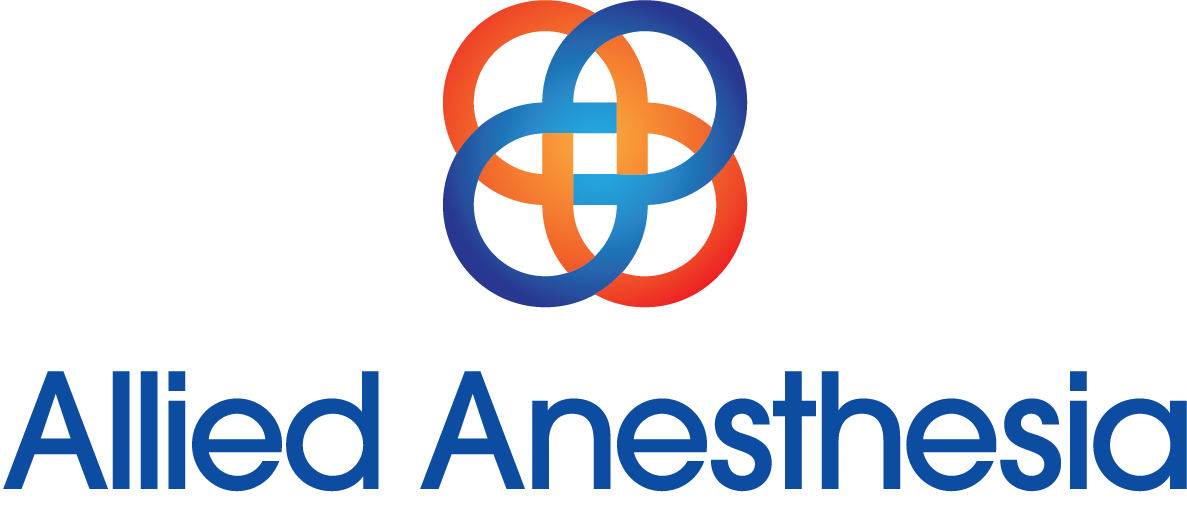WHAT TO EXPECT
Anesthesia is something most people only experience once or twice in their lifetimes, so it is natural to have questions and even to feel anxious.
Your Allied Anesthesiologist will always put your care, your safety, and your comfort
before anything else.
Your Allied Anesthesiologist will never leave your side during surgery.
We have prepared a list of your most frequently asked questions below.
Frequently Asked Questions
WHAT CAN I EAT OR DRINK BEFORE SURGERY?
No solid food and/or non-clear, full liquids up to eight (8) hours before surgery.
Only clear liquids up to four (4) hours before surgery.
Nothing by mouth for the four (4) hour period immediately before surgery.
WHAT CAN MY CHILD EAT OR DRINK BEFORE SURGERY?
Less than 6 months of age:
No clear liquids up to three (3) hours before surgery.
No breast milk up to four (4) hours before surgery.
No formula milk up to six (6) hours before surgery.
No solid food up to eight (8) hours before surgery.
6 months of age or older:
No clear liquids up to three (3) hours before surgery.
No breast milk up to six (6) hours before surgery.
No formula milk up to eight (8) hours before surgery.
No solid food up to eight (8) hours before surgery.
WHAT MEDICATIONS SHOULD I STOP BEFORE SURGERY?
Some medications can be taken before surgery. Please consult with your physician and bring a list of your current medications to your pre-operative surgical appointment.
WHAT IF I HAVE A PACEMAKER OR INTERNAL DEFIBRILLATOR?
Inform the nurse that you have a pacemaker or internal defibrillator during your phone interview and in the pre-operative holding area on the day of surgery.
WILL I WAKE UP IN THE MIDDLE OF SURGERY?
Many patients ask about the possibility of waking up in the middle of an operation. Although this is a very rare occurrence, there have been instances when it has occurred. In anesthesiology, we refer to this as “awareness.” When awareness does occur, it is usually just prior to the anesthetic taking effect or as the patient is emerging from anesthesia. In very rare instances, it may occur during the surgery itself. Should the patient have any concerns regarding awareness, address them with the anesthesiologist during the pre-operative visit.
DOES THE ANESTHESIOLOGIST STAY IN THE OPERATING ROOM DURING THE SURGERY?
Yes. Allied Anesthesia providers remain in the operating room, monitoring the patient, for the entire duration of surgery and during recovery.
IS PEDIATRIC ANESTHESIOLOGY DIFFERENT FROM GENERAL ANESTHESIOLOGY?
Yes. Children require specialized anesthesiology, and all Allied Anesthesiologists have extensive experience treating children. When your child is under the care of an Allied anesthesiologist, you can be sure that they are in the care of one of the country’s most experienced pediatric anesthesiologists.
CAN I BE IN THE OPERATING ROOM DURING MY CHILD’S SURGERY?
Because of the critical importance of maintaining a distraction free environment for the operating team and maintaining proper operating room procedures to ensure a clean and sterile environment, parents are not allowed in operating rooms during surgeries.
WILL MY CHILD’S ANESTHESIOLOGIST BE IN THE OPERATING ROOM DURING THE SURGERY?
Yes. Allied Anesthesia providers remain in the operating room, monitoring your child, for the entire duration of surgery and during recovery.
IS PAIN MANAGEMENT TREATMENT TEMPORARY?
While pain management services performed by an anesthesiologist are designed to give immediate pain relief, they can also have longer lasting benefits by reducing inflammation in the affected areas and thereby reducing the pressure exerted by the body on nerves sending pain signals.
CAN I KEEP NORMAL MEDICATIONS DURING PAIN MANAGEMENT TREATMENTS?
You should always consult your anesthesiologist regarding specific medications before your treatment. Many medications are compatible with pain management treatments, but there are important exceptions – for example, blood thinners – which must be stopped before pain management treatments occur.
CAN I GO BACK TO WORK THE SAME DAY AS RECEIVING PAIN MANAGEMENT TREATMENT?
The amount of recovery time needed will vary by procedure and individual patient physiology. We generally recommend taking 1-2 days off from work around pain management procedures, but some patients do return to work the same day they receive treatment.
AT WHAT POINT DO I NEED TO SEE AN ANESTHESIOLOGIST FOR MY PAIN MANAGEMENT?
Often, other physicians will refer patients to an anesthesiologist for pain management services when they feel that the patient’s pain requires the additional expertise of an anesthesiologist with advanced training in pain management. As a general rule, a patient must have experienced pain for three weeks prior to an initial pain management treatment, and have had a diagnostic MRI performed.
HOW CAN I OBTAIN A COST ESTIMATE FOR THE ANESTHESIA FOR MY PROCEDURE? IS ANESTHESIA INCLUDED IN THE COST OF SURGERY?
Please call our billing office at (714) 619-5391 for a cost estimate. Patients may receive separate bills for surgery: one from the surgeon who performs the surgery and one from the anesthesiologist who provides anesthesia during surgery.
HOW DO I PAY FOR THE ANESTHESIA FOR MY PROCEDURE IF I AM PAYING OUT OF POCKET, OR PAYING FOR THE CO-PAY OR DEDUCTIBLE?
Please call our billing office at (714) 619-5391. They can take payment over the phone with a credit card, or a check can be made payable to Allied Anesthesia Medical Group and mailed to PO Box 1628, Orange, CA 92856.

